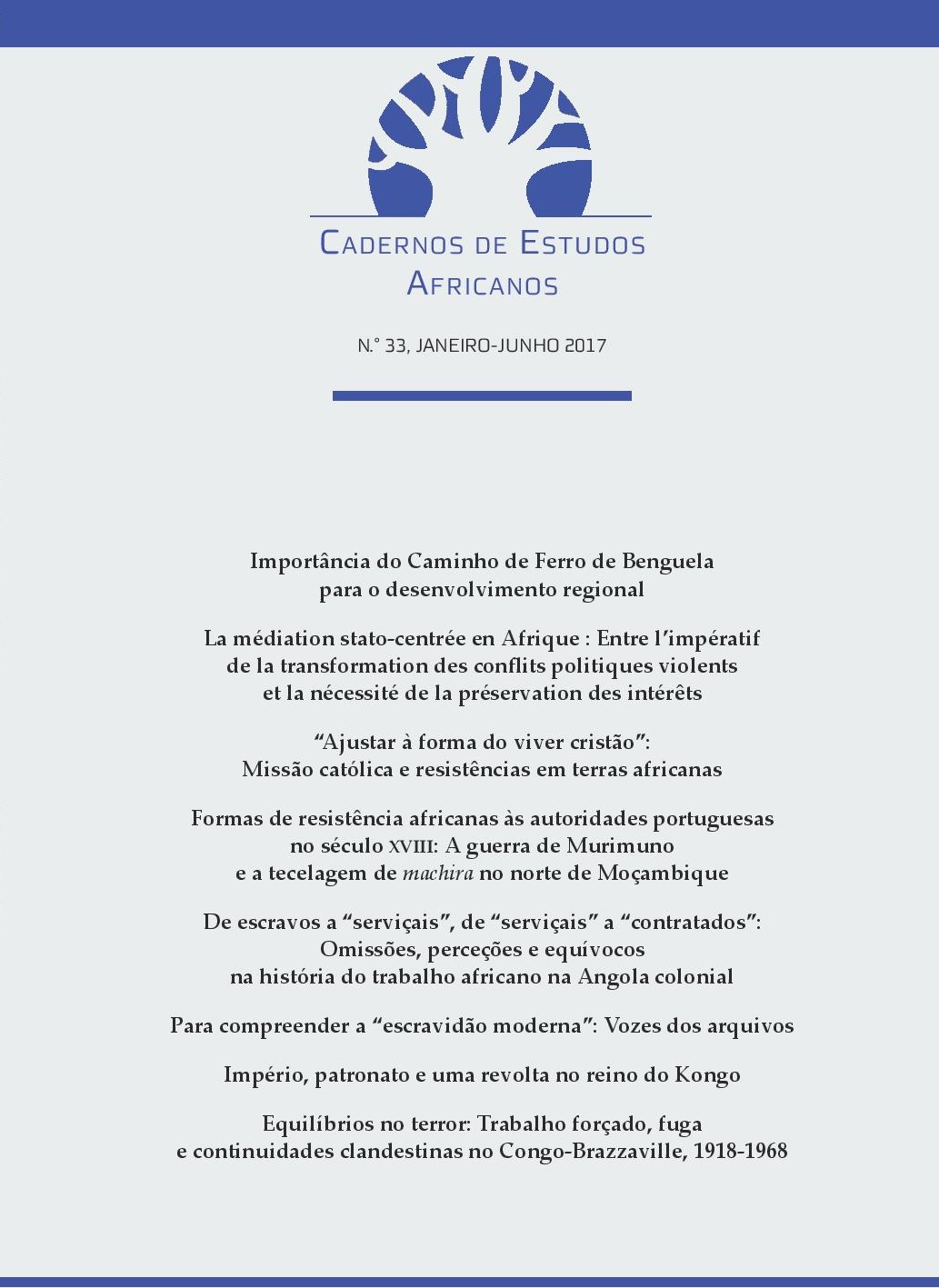Império, Patronato e uma Revolta no Reino do Kongo
DOI:
https://doi.org/10.4000/cea.2225Keywords:
Angola, Kongo, resistência, dominação colonial, clientelismo, cultura políticaAbstract
Este artigo argumenta que o famoso levante ocorrido no Kongo, em 1913, simbolizou uma rotura nas relações clientelistas estabelecidas entre o Estado colonial português, os governantes do Kongo em São Salvador, e seus eleitores locais. Por um lado, a imposição colonial do trabalho forçado minou um contrato social que fazia o rei do Kongo confiável para os chefes subalternos e seus seguidores. A revolta subsequente contra o governante em exercício, Manuel Kiditu, é explicada em termos de economia moral como uma resposta coletiva ao desrespeito às regras da reciprocidade social por parte de Kiditu e seus assessores. Por outro lado, a quebra nas relações de confiança entre Kiditu e o líder rebelde Álvaro Buta também desempenhou um papel crucial na revolta.References
Barnes, S. T. (1986). Patrons and power. Creating a political community in metropolitan Lagos. Bloomington: Indiana University Press.
Bayart, J.-F. (1993). The state in Africa. The politics of the belly. Londres: Longman.
Berman, B. J. (1998). Ethnicity, patronage and the African state: The politics of uncivil nationalism. African Affairs, 97(388), 305-341.
DOI : 10.1093/oxfordjournals.afraf.a007947
Bowskill, J. S. (1914). São Salvador, Portuguese Congo. Mr. Bowskill’s letters on the native war of 1913-4 and other documents. Londres: Carey Press.
Cardoso, J. M. S. (1914). No Congo Português. Viagem ao Bembe e Damba, considerações relacionadas, Setembro a Outubro de 1912. Luanda: Imprensa Nacional de Angola.
Clarence-Smith, W. G. (1983). Capital accumulation and class formation in Angola. In D. Birmingham, & P. M. Martin (Eds.), History of Central Africa. Vol. 2 (pp. 163-199). Londres: Longman.
Clarence-Smith, W. G. (1990). Emigration from Western Africa, 1807-1940. Itinerario, 14(1), 45-60.
DOI : 10.1017/S0165115300005672
Clarence-Smith, W. G. (1993). Cocoa plantations and coerced labor in the Gulf of Guinea, 1870-1914. In M. A. Klein (Ed.), Breaking the chains: Slavery, bondage, and emancipation in modern Africa and Asia (pp. 150-170). Madison: University of Wisconsin Press.
Cooper, F. (2002). Africa since 1940: The past of the present. Nova York: Cambridge University Press.
Coquery-Vidrovitch, C. (1969). Recherches sur un mode de production africain. La Pensée, 144, pp. 61-78.
Coquery-Vidrovitch, C., & Lovejoy, P. E. (1985). The workers of trade in precolonial Africa. In C. Coquery-Vidrovitch, & P. E. Lovejoy (Eds.), The workers of African trade (pp. 9-24). Beverly Hills: Sage.
Diniz, J. O. F. (1914). Negócios Indígenas. Relatório do ano de 1913. Luanda: Imprensa Nacional de Angola.
Fabian, J. (1996). Remembering the present. Painting and popular history in Zaire. Berkeley: University of California Press.
Glassman, J. (1995). Feasts and riot. Revelry, rebellion, and popular consciousness on the Swahili Coast, 1856-1888. Portsmouth: Heinemann.
Grant, K. (2005). A civilised savagery. Britain and the new slaveries in Africa, 1884-1926. Nova York: Routledge.
Janzen, J. M. (2013). Renewal and reinterpretation in Kongo religion. In S. Cooksey, H. Vanhee, & R. Poynor (Eds.), Kongo across the waters (pp. 132-142). Gainesville: University Press of Florida.
Leal, J. H. F. (1915). Memórias d’África. Boletim da Sociedade de Geografia de Lisboa, 33, pp. 15-30.
Lewis, T. (1930). These seventy years. An autobiography. Londres: Carey Press.
Lonsdale, J. (1992). The moral economy of Mau Mau: The problem. In B. Berman, & J. Lonsdale (Eds.), Unhappy valley. Conflict in Kenya and Africa: Vol. 2. Violence and ethnicity (pp. 265-314). Oxford: James Currey.
Mamdani, M. (1996). Citizen and subject. Contemporary Africa and the legacy of late colonialism. Princeton: Princeton University Press.
Mattos, J. A. (1924). O Congo Português e as suas riquezas. Lisboa: Simões, Marques, Santos & Cia.
Mbembe, A. (2001). On the postcolony. Berkeley: University of California Press.
Newbury, C. (2000). Patrons, clients, and empire: The subordination of indigenous hierarchies in Asia and Africa. Journal of World History, 11(2), 227-263.
DOI : 10.1353/jwh.2000.0047
Newbury, C. (2003). Patrons, clients, and empire: Chieftaincy and over-rule in Asia, Africa, and the Pacific. Oxford: Oxford University Press.
Northrup, D. (2002). Freedom and indentured labor in the French Caribbean, 1848-1900. In D. Eltis (Ed.), Coerced and free migration: Global perspectives (pp. 205-228). Stanford: Stanford University Press.
Phillips, A. (1989). The enigma of colonialism. British policy in West Africa. Londres: James Currey.
Rodney, W. (1972). How Europa underdeveloped Africa. Londres: Bogle-L’Ouverture.
Spear, T. (2003). Neo-traditionalism and the limits of invention in British colonial Africa. Journal of African History, 44(1), 3-27.
DOI : 10.1017/S0021853702008320
Thornton, J. K. (1998). The Kongolese Saint Anthony. Dona Beatriz Kimpa Vita and the Antonian Movement, 1684-1706. Cambridge: Cambridge University Press.
Vos, J. (2015). Kongo in the age of empire, 1860-1913. The breakdown of a moral order. Madison: University of Wisconsin Press.
Wheeler, D. L., & Pélissier, R. (1971). Angola. Londres: Pall Mall Press.
Willis, J. (1995). “Men on the spot”, labor, and the colonial state in British East Africa: The Mombasa water supply, 1911-1917. International Journal of African Historical Studies, 28(1), 25-48.
Additional Files
Published
Issue
Section
License
Copyright (c) 2018 Cadernos de Estudos Africanos

This work is licensed under a Creative Commons Attribution-NonCommercial-ShareAlike 4.0 International License.
I authorize the publication of the submitted article/review of which I am the author.
I also declare that this article is original, that it has not been published in any other way, and that I exclusively assign the publication rights to the journal Cadernos de Estudos Africanos. Reproduction of the article, in whole or in part, in other publications or on other media is subject to the prior authorization of the publisher Centro de Estudos Internacionais do Iscte - Instituto Universitário de Lisboa.

